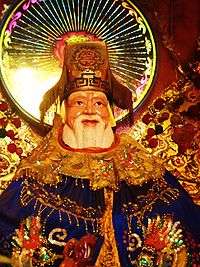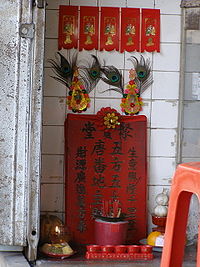- Tu Di Gong
-
Not to be confused with Earth Goddess or Earth goddess.
Tu Di Gong (Chinese: 土地公; pinyin: tǔ dì gōng; Pe̍h-ōe-jī: Thó-tī-kong/Thó͘-tī-kong; literally "Earth God"), also known as Tu Di (土地), Tu Gong (土公), and Dabo Gong (大伯公), is a Chinese earth god worshipped by Chinese folk religion worshippers and Taoists. A formal name for Tu Di Gong is Chinese: 福德正神; pinyin: Fúdé zhèngshén, meaning the earth god of wealth and merit.[1][2]
In China, every village[citation needed] had a shrine to Tu Di Gong. It was this deity who was in charge of administering the affairs of a particular village. In traditional times, village concerns were primarily agricultural or weather-related. This god was not all-powerful, but was a modest heavenly bureaucrat to whom individual villagers could turn in times of drought or famine. [1]
Today, he is still worshipped by most Chinese, with many housing small shrines with his image, commonly located under the main altar, or below the house door. Many worships make prayers to him for wealth and their well being. He is also traditionally worshipped before the burial of deceased persons to thank him for using his land to return their bodies to the earth.[1]
Commoners often called Tu Di Gong "Grandpa," which reflects his close relationship to the common people.[1]
Tu Di Gong is portrayed as an elderly man with a long white beard, a black or gold hat and a red or yellow robe, which signifies his position as a bureaucrat. He carries a wooden staff in his right hand and a golden ingot on the left. [1]
Contents
Tu Di Po
In the countryside, he is sometimes given a wife, Tu Di Po (土地婆 tǔ dì pó, lit. Earth Goddess), placed next to him on the altar. She may be seen as a just and benevolent deity on the same rank as her husband, or as a grudging old woman holding back her husband's benedictions, which explains why one does not always receive fair retribution for good behaviour. [1]
Another story says that Tu Di Po is supposed to be a young lady. After Tu Di Gong received a heavenly rank, he gave everything that the people asked for. When one of the gods went down to Earth to do inspections, he saw that "Tu Di Gong was distributing blessings unnecessarily. Soon after that, the god went to the Celestial Palace and reported to the Jade Emperor. [1]
After the Jade Emperor knew about this, he found out that there was a lady that was going to be killed, but she was not wrong. Thus, the Jade Emperor told a god to go down to Earth and bring the lady to heaven. When the lady was brought to the Celestial Palace, the Jade Emperor bestowed her as Tu Di Gong's wife.. She was ordered to look after how much blessings Tu Di Gong distributes and that it shouldn't be unnecessarily distributed. This is why many people do not want to pay respect to Tu Di Po, because they are afraid that she will not let Tu Di Gong give lots of wealth to them. [1]
Di Zhu God
Dizhu (Chinese: 地主神, meaning Earth Spirit) is a spirit in Chinese folk beliefs, which is analogous to Tu Di Gong. Di Zhu God's tablet is inscribed with (middle two rows) "left: The Earth God of Overseas Tang peoples (Overseas Chinese), right: The dragon of five sides & five lands (Fengshui). The side inscriptions mean "The wealth comes from ten thousand directions and the business comes from thousands of miles." It is believed that the Di Zhu God has powers to help gather wealth, and the position of the tablet must be placed properly according to the laws of Feng Shui.[1]
Village gods in Taoism
In Taoism, the God of Village have developed from land worship. Before Gods of Towns dominated in China, land worship had a hierarchy of deities conforming strictly to social structure, in which the emperor, kings, dukes, officials and common people were allowed to worship only the land gods within their command; the highest land deity was the Earthly Queen of the Four Imperial Ones. Ranked lower than Town gods, the God of Village have been very popular among villagers as the grassroot deities since the 14th century during the Ming Dynasty. Some scholars speculate that this change came because of a royal edict, because it is reported that the first emperor of the Ming dynasty was born in a Village God shrine. The image of the Village God is that of a simply clothed, smiling, white-bearded man. His wife, the Grandma of the Village, looks like any old lady who lives next door.[1]
See also
References
- ^ a b c d e f g h i j The Encyclopedia of Malaysia, vol. Religions & Beliefs, edited by Prof. Dr M. Kamal Hassan & Dr. Ghazali bin Basri ISBN 981-3018-51-8 www.selectbooks.com.sg
- ^ Keith G. Stevens, Chinese Mythological Gods, Oxford University Press, USA, (November 8, 2001), pages 60, 68, 70, #ISBN-10: 0195919904 or # ISBN-13: 978-0195919905
External links
- 安奉神位保家運 (Chinese)
- www.chinastyle.cn/
Categories:- Chinese gods
- Fortune gods
- Earth gods
- Taoism
Wikimedia Foundation. 2010.


